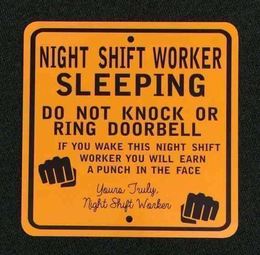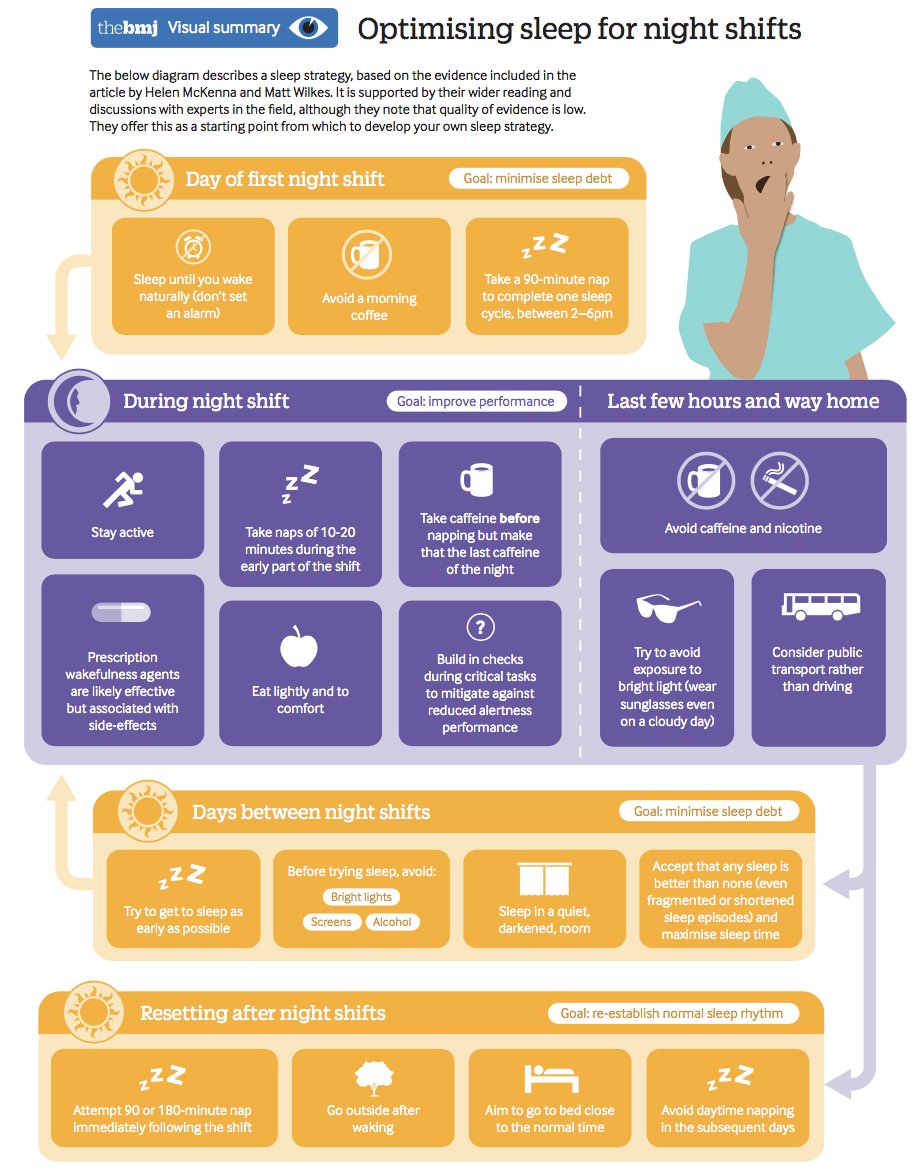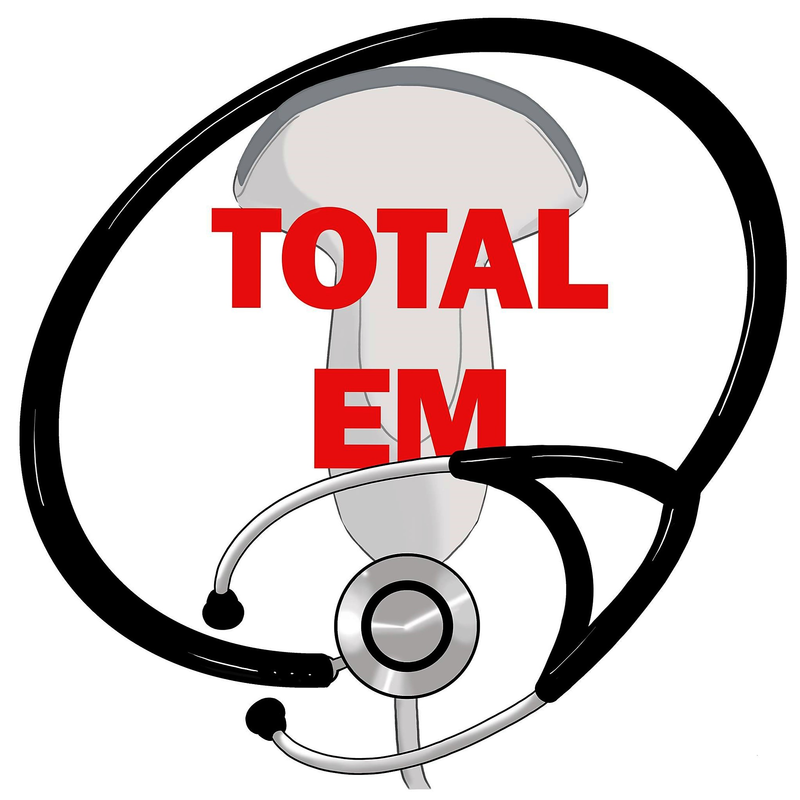|
Night shift can be rewarding and some of us choose to do it all the time. There is little to no administration, the crew tends to be more relaxed (but obviously place variant), the cases can be a bit more interesting, the patients are very different from the daytime (both good and bad), and it can there are the small things that is hard to list but you can truly appreciate with time (watching meteor showers and shopping while the rest of the world is asleep) are only a few of the bonuses. However, it also has its challenges and it is hard to get into the routine. We discuss some tips from friends, other media, and research in this review.

First off, night shift just like days and mid-shifts need to be a lifestyle. If at all possible we should work in places where we could always stick to the same schedule. This helps accomplish one of the biggest problems: the circadian rhythm. As you may recall from training, this is basically our internal alarm clock that is located in the hypothalamus and keeps us on track.
If you cannot keep the same schedule, use a clockwise rotation of the schedule. That means you transition from days, to mids, to nights. Also, group these shifts as much as possible to avoid the constant change in the sleep schedule. However, avoid so many in a row that you can become sleep deprived. If you are new to this system maybe only do a night or two and then build up over time. Even if we adjust our circadian rhythm, there are some tricks to keep it that way. Whether you work the occasional night shift or like the author and do it as a living, the biggest trick is consistency. If you are unfortunate enough to have to switch straight from days to nights, you may want to try and get a nap before work. The thought here is that by keeping your regular schedule, followed by an afternoon nap will keep you closer to your circadian rhythm. Another, more radical option, are “casino” shifts which end or begin in the middle of the night and limited data demonstrations improvement of the number of patients seen per hour. During the shift gets a bit trickier. Those who normally work days will usually become their most tired at approximately 02:00 and coldest at approximately 04:00. The mental fatigue (especially in short runs of night shifts) is particularly challenging since your mind is not used to working at such a late hour. Little breaks and bursts of activity (something that should be done anyway on a normal shift) can help bring back alertness. Be careful about heavy or spicy meals. Overall, good healthy options are best. This can trick your body into becoming more tired. Too much sugar can do the same thing. Caffeine use is very controversial but use as little as possible and avoid it late at night so as not to keep you up well past the end of your shift. Lighting is a big part of night shift. Those not used to it will try to keep the lights turned down to be “soothing” or provide them with rest. However, this is your daytime and your body needs to recognize that. Keep the lights up like you would if this was your normal day. If you work night shift all the time and keep this schedule, this is a must to do on all your nights. The circadian rhythm is influenced by light and to trick it you need lights! Something else we should be doing on any shift but especially if we are working a different shift than what is normal (or just more tired) is recognizing our limitations in complex decision making. When you start realizing that it is harder to think through everything, start asking for help. Waiting to make decisions when possible until a second set of eyes (that are more awake) can also take a look. This could be at shift change when you wait to discharge a patient until you can at least talk to someone else. Most of us work with other experienced and knowledgeable individuals. Talk it out and see what their thoughts are. The key is to always reach out for both you and your patient’s safety. What about when you finish your shift? This can be potentially the most dangerous part. There is plenty of evidence that the drive home can be extremely dangerous. If you are too tired, stay in a room. We will probably all do this at some point and there should be a safe place to lay your head for however long you need before you can leave. If you are not certain, ask your director or charge nurse and they will most likely know a good place until you are safe. If you feel like you can safely leave but just need something to keep up your attention, this may be a time where you start to consider small meals and other activities. This can be a great time to listen to something that will help you relax (but not sleepy). For example, sing along to songs or listen closely to podcasts. Find something engaging but will still keep your eyes wide open and on the road. Now that you are home, it is time to get to bed. Avoid activities that will make you more awake. If you had not already done so on the drive home, the lights need to be turned down and avoid any bright lights. Again, we are trying to trick the circadian rhythm. Also avoid alcohol, caffeine, and sleeping medications. They may initially feel helpful but rarely give an actual restful night’s sleep. If not already done, start cooling down the bedroom. A colder environment tends to help with sleep. When laying down consider something to shield your eyes and cover your ears (like wax ear plugs). If you do not like that sensation, use blackout curtains especially heavy ones that help drown out sound. White noise makers are also beneficial. Also, turn off any and all distracting technologies as possible. There are modes on most phones to keep most calls from waking you up unless you want them to wake you (such as family being excluded on that list or if someone calls repetitively). Make sure family, friends, and other visitors know to leave you alone. A sign on the door could be beneficial or just turn off the doorbell. If switching back to days, cut that sleep shorter to help keep you tired enough to go back to daytime. This is a day you will need to stay busy with activities that will keep you moving but low risk (such as avoiding driving). What tips do you have? Mental health can sometimes be an issue but it is important to have a life no matter what schedule you have and to be happy with it. Use family, friends, and coworkers to keep the healthy balance.
Important clinical update:
On March 1, 2018 the BMJ had a new article published called "Optimising sleep for night shifts" and we have included it along with its infographic which acts as a visual summary. Let us know what you think by giving us feedback here in the comments section or contacting us on Twitter or Facebook. Remember to look us up on Libsyn and on iTunes. If you have any questions you can also comment below, email at [email protected], or send a message from the page. We hope to talk to everyone again soon. Until then, continue to provide total care everywhere.
0 Comments
Leave a Reply. |
Libsyn and iTunesWe are now on Libsyn and iTunes for your listening pleasure! Archives
August 2022
Categories |
||||||



 RSS Feed
RSS Feed